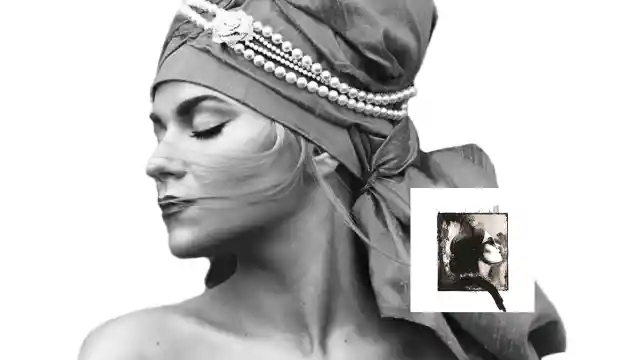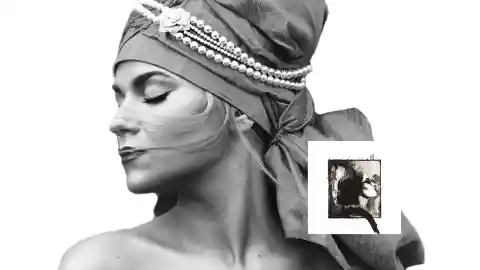

I will confess that Currency of Man is one of my favorite Gardot albums. It is not only the perfect “next album” in Melody Gardot’s career, it elicits all of humanity within her music making – hope, sorrow, love, hate and it is her sonic impressionist reporting of (mostly contemporary) urban life. While her earlier albums, Worrisome Heart and My One and Only Thrill were within the core of vocal jazz, she really branched out in The Absence to different and more experimental sounds. The Absence grew on me over time but it didn’t resonate immediately as did the earlier two. Now comes, Currency of Man which still has the stamp of experimentation and an almost playful quality to it while bringing it more into the heart of vocal jazz and making it a bit more accessible. I saw her recently referred to as a soul singer; I think that’s probably the best epithet to use; yes she focuses on jazz but since The Absence, she performs across genres. The production and orchestration on the album is almost dead-on perfectly aligned with the songs and their meaning. You might think a Larry Klein production would be overly lush but this has minimalist songs as well as lush productions. Clément Ducol brings his own Franco-laced touch. The overall sound is an ideal blend of vocal and orchestration. Given that another perspective on the album has already been given on FDRMX here, I’ll focus on the songs from The Artist Cut along with some others of particular note on an album filled with fabulous songs.
From the moment the album opens “Don’t Misunderstand” with a musical “hey hee hi hmm” as only Melody Gardot can voice, you know you’re in for an unusual, delightful treat. Layers of brushed drums, keyboards/synthesizer, percussion, strings, and spoken word weave together undergirding her voice. This introduction crescendos to a vocal center where you already feel under the spell of her honeyed voice and release into the “ebb and flow river bound.” That same “c’est la vie” attitude seems to permeate the relationship in “Don’t Talk:” “Don’t care about what you do/Don’t care about what you think/Don’t care about who you knew.” It is not about caring, but rather the facade you present is no basis for a relationship. I love the stick to drum side beat with swelling strings. All of this album is perfectly orchestrated.
Bells on the square and it’s gonna come. Sheer funk. Great beat, brass and sax all align together to call us to “that man,” that invisible man in the square with the sign asking for donations. The bluesy “Bad News” takes a different tact with a great introduction of xylophone and percussion with the melody being carried by guitar. Oh and the bad news has arrived, it’s closing time. “Put on your armor/march yourself in line/swallow all your feelings…” as the sax wails out our sorrow. That same playful attitude of a loss of bar time comes into a moment evoking how we’re sometimes marginalized even when we’re blissfully ignorant. She don’t know that full effect she has on guys and the marginalizing cat calls of those same guys.
The melancholy seeps from “No Man’s Prize,” a song from the perspective of a whore who realizes that Jack is trying to fool himself that there is more going on than a transaction: “Jack, take it easy/Who you’re trying to fool?/Gonna lay my gaveling down/Kling/Exclusionary rules/I say Jack, nobody’s perfect, but we’re perfectly alive/You done had a woman/And I done had the time…You ought to open up your eyes and see that I’m no man’s prize” Everything comes together to set the mood of the song, piano, horn and voice.
Some fun touches added to The Artist’s Cut are putting palms to work on “Palmas Da Rua,” in a bit of personal percussion. It’s a cool little piece that extends organically from “She Don’t Know” and the underlying percussion in it. The transition into “March for Mingus” is equally smooth. It’s not only a lovely homage, it’s just plain fun. Brief fun, but fun.
Some suggest that “If Ever I recall Your Face” is a bit over-produced. OK, it is a bit heavy on the strings, but it seems to fit. Unlike some of Diane Krall’s Wallflower which did cross that line a bit, the tie to the meaning and the song seems to make sense on this track.
“Once I Was Loved” is a beautiful ballad from one who can sing a story with the best. Again, the orchestration seems to tie nicely. As we gently go into the night, memories of love help sustain us.
We have a lovely, lyrical piano piece in “After the Rain.” It reminds me of the dripping that comes off the trees as the breeze picks up and shakes the leaves.
“Burying My Troubles” starts off sounding like a moody soundtrack to a troubled life. I picture this sorrow-filled song taking place at the bar or maybe a piano in a bar as she buries her troubles in another glass of gin. This is another great marriage of vocal and orchestration to build the sorrow and emotion, a life of loss and pain.
The album contains powerful songs like Preacherman reminding us of the terrible crime of Emmett Till’s murder while still hoping that we create a better world to the delightful and light “After the Rain” and the funk of It Gonna Come. There is incredible range, velvety singing and “right-sized” orchestration. It’s a beautiful, unique and impossible to peg collection that makes a coherent whole. Melody Gardot really hits the mark.